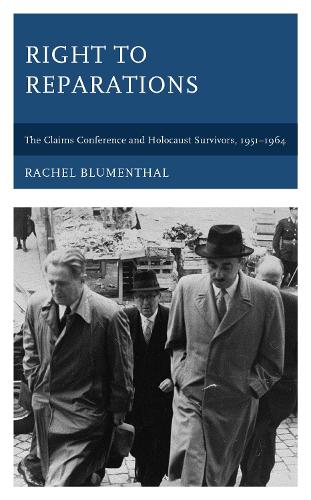
Right to Reparations: The Claims Conference and Holocaust Survivors, 19511964
(Hardback)
Publishing Details
Right to Reparations: The Claims Conference and Holocaust Survivors, 19511964
By (Author) Rachel Blumenthal
Bloomsbury Publishing PLC
Lexington Books
7th July 2021
United States
Classifications
Professional and Scholarly
Non Fiction
The Holocaust
International law
Judaism
History of religion
940.5318144
Physical Properties
Hardback
224
Width 163mm, Height 228mm, Spine 24mm
508g
Description
This book examines the early years of the Claims Conference, the organization which lobbies for and distributes reparations to Holocaust survivors, and its operations as a nongovernmental actor promoting reparative justice in global politics. Rachel Blumenthal traces the founding of the organization by one person, and its continued campaign for the payment of compensation to survivors after Israel left the negotiations. This book explores the degree to which the leadership entity served individual victims of the Third Reich, the Jewish public, or member organizations.
Reviews
Right to Reparations: The Claims Conference and Holocaust Survivors, 19511964 revises the existing scholarship about the Claims Conference, arguably the most important Diaspora-based Jewish organization in the decades after 1945. Rachel Blumenthal expertly explores the origins, decision-making, and operations of this pivotal transnational agency founded for the benefit of Holocaust survivors. Right to Reparations offers us a clear, balanced understanding of what is still an extremely volatile issue: the plight and rights of Holocaust survivors, refugees, and their descendants. Right to Reparations will soon become part of ongoing debates in the Jewish world today at the intersection of history, equity, practice, and Diaspora-Israel relations.
-- Jonathan Dekel-Chen, Hebrew University of JerusalemThe history of the Claims Conference constitutes a major lacuna in our understanding of Israeli and post-Holocaust Jewish history. Based on a careful and critical reading of primary sources, Blumenthals work makes a novel and persuasive contribution that fills this gap. This book is a welcome addition to the growing library on Jewish communal leadership, diplomacy, and Israel-Diaspora relations after the Holocaust. It is an excellent example of superb scholarship combined with lucid writing that will appeal to a wide audience of readers!
-- Csaba Nikolenyi, Concordia UniversityWhen WWII ended, the world needed healing, justice. . . West Germany agreed to reparations, money was sent to Jewish victims, organizations, the Jewish state. It all seems natural. Blumenthal pulls back the curtains and voil, nothing was natural. Compensation elicited conflict and struggles, but also cooperation and coordination over five continents. The Holocausts after-history exposes a very human tale about Jewish politics in which power, justice, finance, and memory come together to settle an unsettled past.
-- Brian Horowitz, Tulane UniversityAuthor Bio
Rachel Blumenthal is a lawyer and a historian. She is a fellow at the Avraham Harman Research Institute of Contemporary Jewry at the Hebrew University of Jerusalem.
